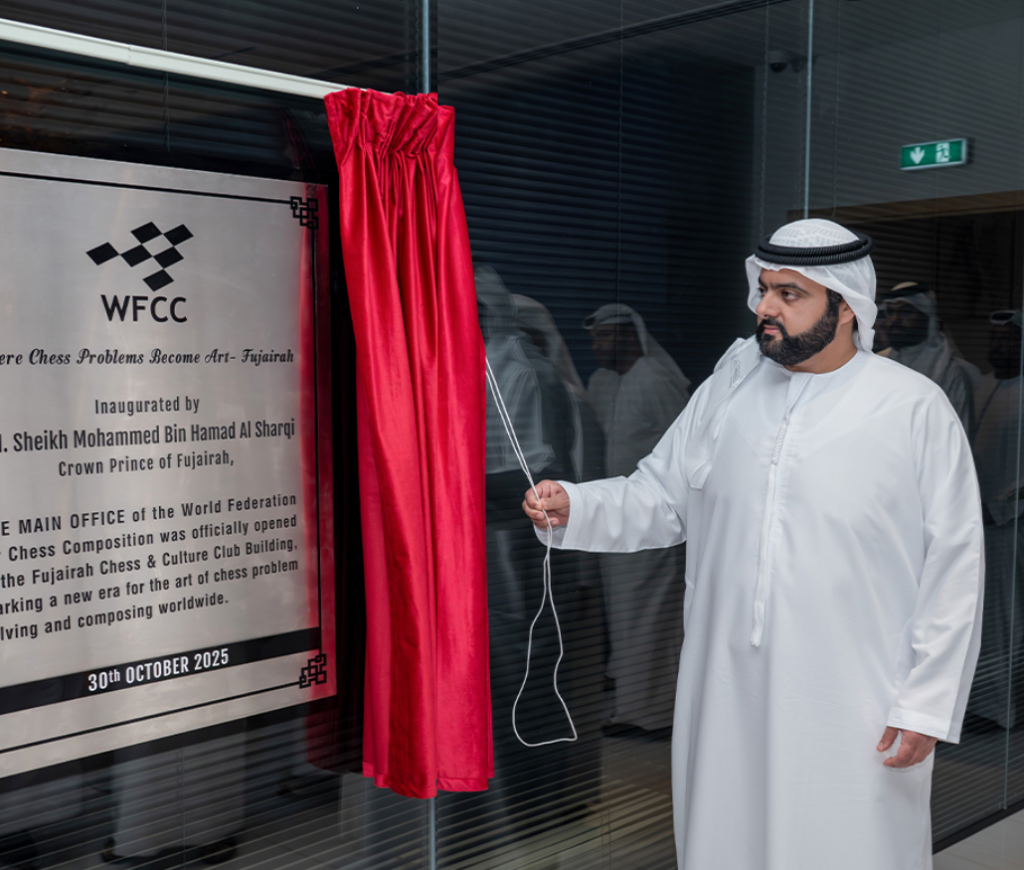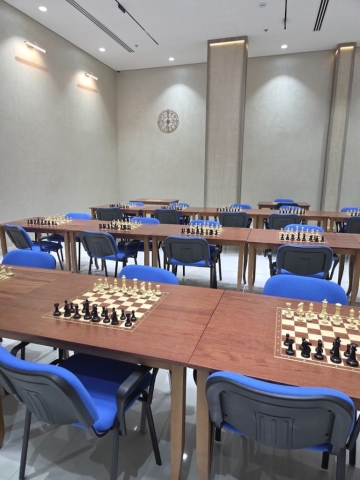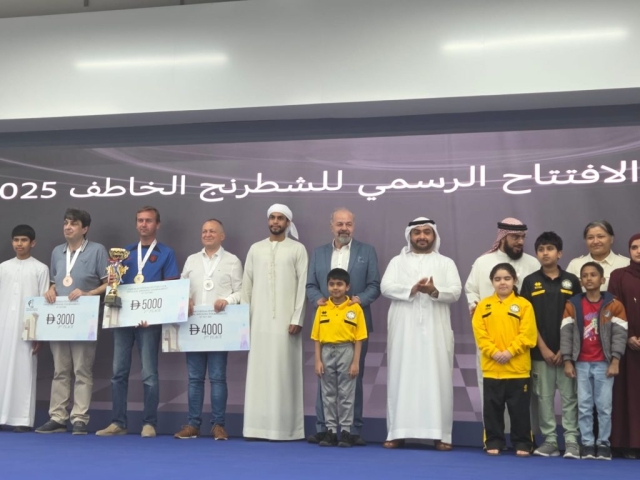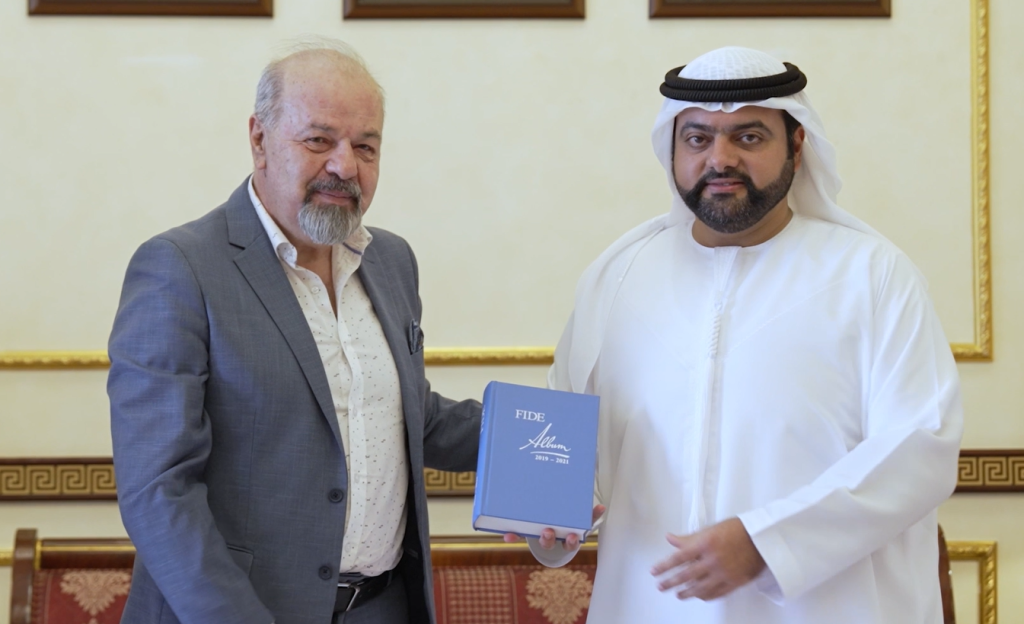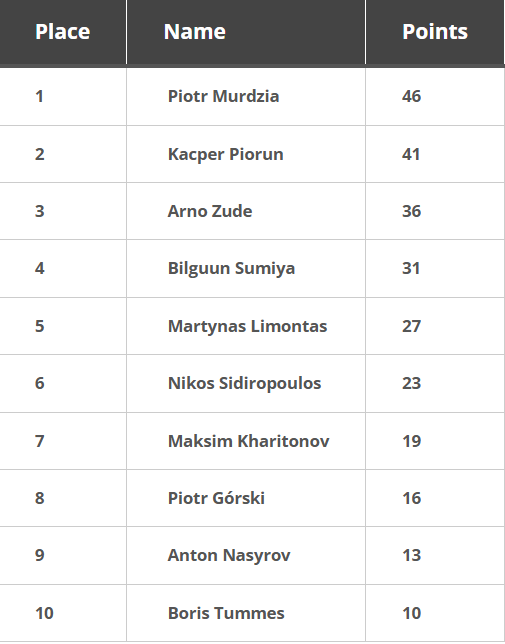Solvers’ ratings as of January 1st 2026 produced by the Solving Tournament Manager are published on the WFCC Solving Portal.
9 tournaments of the 4th quarter 2025 are included: Open Solving Tournament Hamlet Amiryan MT-2025, 34th Kedainiai Cup 2025, 2nd Hamlet Amiryan Memorial Tournament 2025, 40th Open Swiss Solving Championship 2025, 6th Branko Babic Memorial 2025, 30th Belgian Championship 2025, 30th Belgian Championship 2025 Cat-B, 34th Henk Hagedoorn Memorial 2025, Cugir City Championship, 10th Greek Chess Solving Cup 2025.
Ranking of the top 10 solvers: 1. Danila Pavlov (FID) 2824.17 (-11.11), 2. Piotr Murdzia (POL) 2751.23, 3. Kacper Piorun (POL) 2746.15, 4. Ural Khasanov (FID) 2664.47 (+10.6), 5. John Nunn (GBR) 2640.20, 6. Eddy Van Beers (BEL) 2629.43 (+4.8), 7. Bojan Vučković (SRB) 2596.25 (+0.06), 8. Aleksey Popov (FID) 2591.59 (+11.09), 9. Nikos Sidiropoulos (GRE) 2587.04 (-2), 10. Martynas Limontas (LTU) 2579.45 (-0.45).
Largest 5 gains (all juniors!): Pavel Ekimov (FID) +64.92, female Darya Efimova (FID) +57.75, Anton Nasyrov (FID) +50.83, Ekaterina Shestakova (FID) +50.13, Razvan-Andrei Burja-Udrea.(ROU) +45.41.
Category: Other
Happy New Chess Composition Year 2026!
68th WCCC and 49th WCSC in Magdeburg (Germany)

I am pleased to announce that the 68th World Congress of Chess Composition, including the 49th World Chess Solving Championship, will take place from 8–15 August 2026 at the Maritim Hotel Magdeburg, Germany (with the program starting on Sunday, 9 August).
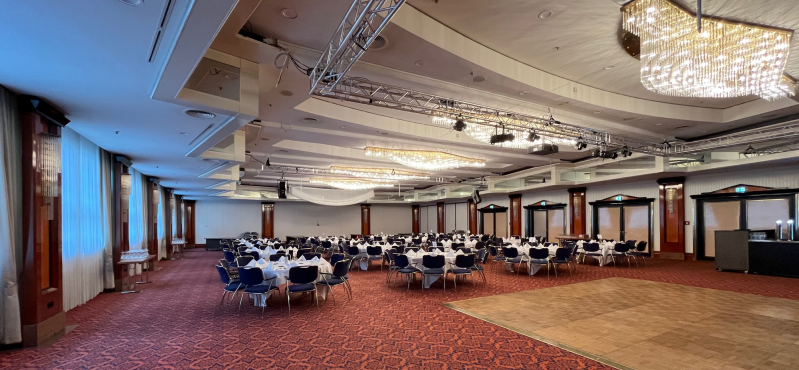
The bid for WCCC 2026 was approved by email voting of 29 out of 44 WFCC delegates, with 28 votes in favor and one abstention. This strong support reflects our shared appreciation and gratitude to Torsten Linß and the German team for stepping in and successfully securing WCCC 2026.
Further details of the bid can be found here
A dedicated congress website, including registration information, will be launched by the end of January.
The end of 2025 has also brought several encouraging developments:

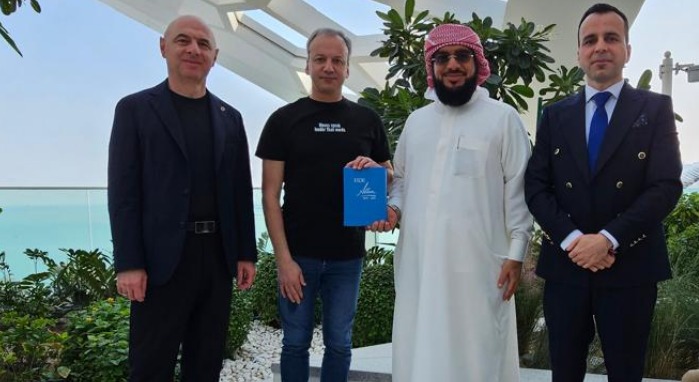
- During the FIDE World Rapid & Blitz Championship in Doha (Qatar), the 1st Vice-President of WFCC, Abdulla Ali Aal Barket, and the WFCC Secretary, Mohammad Alhallak, held a constructive meeting with FIDE President Arkady Dvorkovich, FIDE Special Tasks Director Akaki Iashvili, and FIDE Chief Operating Officer Sava Stoisavljević.
The FIDE officials were informed about key WFCC projects, including:
FIDE & WFCC youth solving championships, FIDE titles for trainers and mentors in solving and composing, the WFCC Fujairah Grand Prix 2025–26, the FIDE Album, and the FIDE World Cup in Composing.
At the conclusion of the meeting, the WFCC Vice-President presented the FIDE Album 2019–21 to the FIDE President. - On the initiative of WFCC Honorary President Klaus Wenda, the WFCC Presidium agreed to organize a special composing tourney in eight traditional sections, marking 70 years of WFCC (1956–2026).
Narayan Shankar Ram has accepted the role of tourney director. Prize funds for each section will be €200, €150, and €100 for the first three places. The tourney is planned to be announced in the first months of 2026. - The Fujairah Chess & Culture Club invites WFCC delegates to apply for Fujairah Government grants supporting WFCC development projects in 2026.
Written proposals aimed at spreading chess composition in new regions and among younger generations should be submitted to the WFCC President by 1 March 2026. Projects using the WFCC Fujairah Grand Prix logo may receive funding of up to €3,000 in 2026.
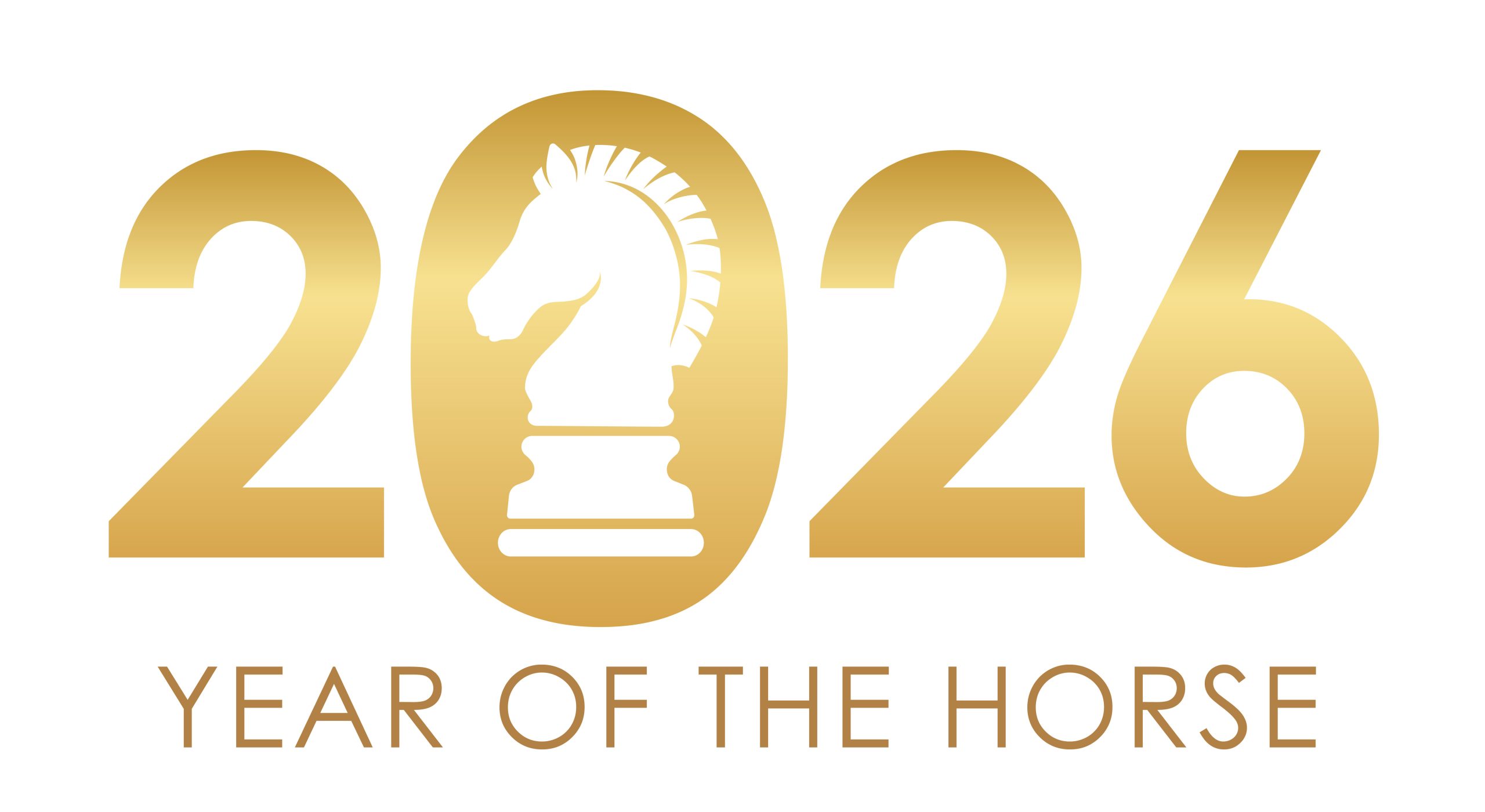
With this encouraging news, I would like to wish you all a very happy and successful New Year, and to thank you once again for your continued support, cooperation, and collegial spirit.
Marjan Kovačević
WFCC President
WFCC Office Inaugurated in the New Fujairah CCC Palace
Opening Ceremony
On 30 October 2025, a solemn opening ceremony was held to mark the inauguration of the WFCC office in the magnificent new home of the Fujairah Chess & Culture Club (FCCC). The office, located within the splendid three-storey chess palace, was officially opened by H.H. Sheikh Mohamed bin Hamad Al Sharqi, Crown Prince of Fujairah.
On 3 November, a reception for WFCC members took place in the palace of His Highness, who showed remarkable interest in the discussion about Arabic chess manuscripts and the oldest known chess problems — mansubas.
WFCC President Marjan Kovačević expressed heartfelt gratitude to the Crown Prince for his generous and continuous support to the Federation — both on an annual basis and through the WFCC Grand Prix cycles — and presented him with the latest edition of the FIDE Album.
Meanwhile, on 1 November, WFCC Secretary Mohammad Alhallak, together with WFCC Vice-President and FCCC Chairman Abdulla Ali Aal Barket, hosted the WFCC online meeting, which was broadcast directly from the new Fujairah Chess Club premises.
The initiative to create this luxurious chess palace, capable of hosting several hundred chess players, originated from the Al Sharqi royal family in 2016. Already by 2017, the FCCC organized its first solving tournament, and in 2019, proudly represented the United Arab Emirates as a new member of the WFCC. Looking ahead, at the end of 2026, this beautifully adorned palace will host the final competition of the 1st WFCC Fujairah Solving Grand Prix 2025–2026, promising another milestone in the flourishing partnership between the WFCC and the Emirate of Fujairah.
Final results of the 12th FIDE World Cup in Composing
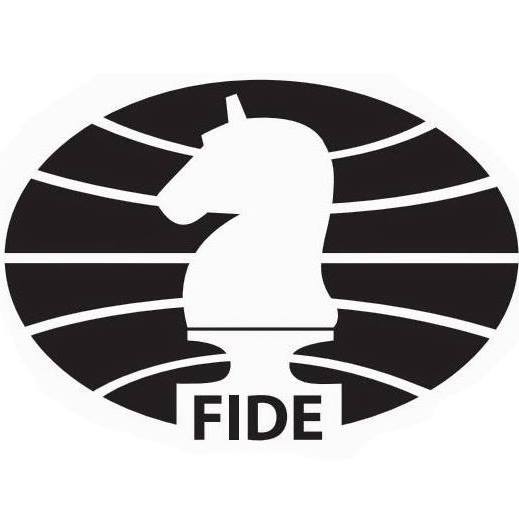
The FINAL results of the 12th FIDE World Cup in Composing 2025 are published and can be found above the Announcement, in the FINAL Results section.
FINAL Results in all sections, PDF | PGN for Endgame studies
A total of 279 problems and studies have been received.
During the claims stage, three problems were found to be unsound (one selfmate and two retros). In contrast, one study that was deemed to be unsound is now included in the award. One helpmate and one retro turned out to be partially anticipated. The awards have been adjusted by the judges accordingly. Also, there have been objections regarding the originality of the winner of the moremover section which the judge rejected as unjustified.
Winners:
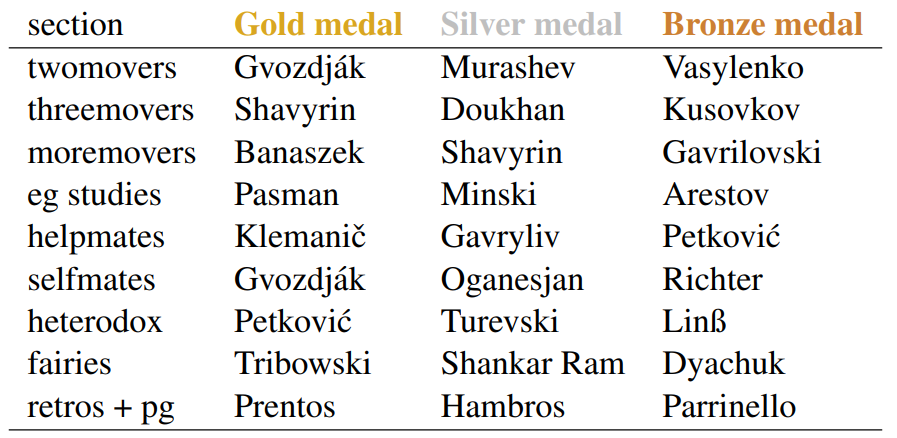
Notes: Two awards have not been translated into English. Given the availability of tools like DeepL and Google Translate, I consider a translation unnecessary.
Some solutions in the studies section are very short. The full solutions provided by the authors can be found in the PGN-file distributed with this award.
Director of the tournament: Torsten Linß (worldcupcomposing2025@gmail.com)
Solvers’ ratings October 1st 2025
Solvers’ ratings as of October 1st 2025 produced by the Solving Tournament Manager are published on the WFCC Solving Portal.
4 tournaments of the 3rd quarter 2025 are included: Open Solving Tournament of WCCC 2025, 48th World Chess Solving Championship 2025, 7th Ukrainian Solving Cup 2025, Pavlos Moutecidis Memorial Solving Tournament.
Ranking of the top 10 solvers: 1. Danila Pavlov (FID) 2835.28, 2. Piotr Murdzia (POL) 2751.23 (+57.48), 3. Kacper Piorun (POL) 2746.15 (+21.14), 4. Ural Khasanov (FID) 2653.87, 5. John Nunn (GBR) 2640.20, 6. Eddy Van Beers (BEL) 2624.63 (-34.18), 7. Bojan Vučković (SRB) 2596.19, 8. Nikos Sidiropoulos (GRE) 2589.04 (+22.52), 9. Aleksey Popov (FID) 2580.50 (+20.2), 10. Martynas Limontas (LTU) 2579.90 (+28.6).
Largest 5 gains (all juniors!): female Darya Efimova (FID) +173.82, Anton Nasyrov (FID) + 156.28, Taras Rudenko (UKR) +127.35, Chinguun Sumiya (MGL) +84.72, Cristian-Daniel Oltean (ROU) +81.52.
Preliminary results of the 12th FIDE World Cup in Composing

The Preliminary results of the 12th FIDE World Cup in Composing 2025 are published and can be found above the Announcement, in the Preliminary Results section.
Results in all sections, PDF | PGN for Endgame studies
The deadline for claims: 7th October, 2025
Director of the tournament: Torsten Linß (worldcupcomposing2025@gmail.com)
WFCC Fujairah Grand Prix 2025-26: 2nd LEG

Upon a personal initiative of
HH Sheikh Mohammed bin Hamad Al Sharqi
Crown Prince of Fujairah
◈◈◈
The 2nd qualification tournament of the WFCC Fujairah Grand Prix 2025-26 has been concluded in Alba Iulia.
See the regulations of the Grand Prix, the current Standings, tournaments, money prizes on the official website of the Grand Prix.

Solvers’ ratings July 1st 2025
Solvers’ ratings as of July 1st 2025 produced by the Solving Tournament Manager are published on the WFCC Solving Portal.
13 tournaments of the 2nd quarter 2025 are included: 46th Lithuanian Championship 2025, 44thAzerbaijan Solving Championship 2025, 1st Solving Championship of Akhaia Region, 47th German Solving Championship 2025, Open Solving Tournament of ECSC 2025, 18th European Chess Solving Championship 2025, Open Solving Championship of Serbia 2025, 10th Israel Open Solving Championship 2025, 10th Israel Open Solving Championship 2025 – Cat. 2, 51st Latvian Chess Solving Championship 2025, 33rd Chess Solving Championship of Slovakia 2025, 46th French Chess Solving Championship 2025, 33rd Czech Chess Solving Championship 2025.
Ranking of the top 10 solvers: 1. Danila Pavlov (FID) 2835.28, 2. Kacper Piorun (POL) 2724.17, 3. Piotr Murdzia (POL) 2693.51, 4. Eddy Van Beers (BEL) 2657.99, 5. Ural Khasanov (FID) 2653.87, 6. John Nunn (GBR) 2639.31, 7. Bojan Vučković (SRB) 2595.94, 8. Nikos Sidiropoulos (GRE) 2565.68, 9. Aleksey Popov (FID) 2560.30, 10. Danila Moiseev (FID) 2555.00.
Largest 5 gains: junior female Anastasiya Chekina (FID) +188.49, Evgenios Ioannidis (GRE) +153.08, junior Anton Nasyrov (FID) +138.84, Stamatis Kourkoulos-Arditis (GRE) +110.24, Anna Shukhman , (FID) +88.18.
Solvers’ ratings April 1st 2025
Solvers’ ratings as of April 1st 2025 produced by the Solving Tournament Manager are published on the WFCC Solving Portal.
11 tournaments of the 1st quarter 2025 are included: 48th International Polish Championship 2025, 21st International Solving Contest 2025 Cat 1, 21st International Solving Contest 2025 Cat 2, Winton British Chess Solving Championship 2025, Winton British Chess Solving Championship 2025 Minor, 46th Finnish Chess Solving Championship 2025, Romanian Solving Championship 2025, 30th Dutch Open Chess Solving Championship 2025, 33rd Branko Atanackovic Memorial 2025, 39th Ukrainian Championship 2025, 23rd Greek Chess Solving Championship 2025.
Ranking of the top 10 solvers: 1. Danila Pavlov (FID) 2835.28, 2. Kacper Piorun (POL) 2759.81, 3. Piotr Murdzia (POL) 2680.47, 4. Ural Khasanov (FID) 2653.87, 5. John Nunn (GBR) 2639.31, 6. Nikos Sidiropoulos (GRE) 2592.12, 7. Eddy Van Beers (BEL) 2589.02, 8. Bojan Vučković (SRB) 2581.32, 9. Ilija Serafimović (SRB) 2569.87, 10. Aleksey Popov (FID) 2560.30.
Largest five gains: junior female Nika Riabenko (UKR) +66.24, junior Szymon Boryna (POL) +61.65, Robert Włodarczyk (POL) +56.27, Piotr Kejna (POL) +54.36, Kacper Piorun, (POL) +42.53
12th FIDE World Cup in Composing 2025: Announcement

Composers from all around the world are welcome to take part in the
12th FIDE World Cup in Composing 2025!
The sections are:
- Twomovers (Marco Guida)
- Threemovers (Frank Reinhold)
- Moremovers (Kjell Widlert)
- Endgame studies (Michal Hlinka)
- Helpmates (Dmitri Turevski)
- Selfmates (Ivan Soroka)
- Heterodox problems (Vlaicu Crisan)
- Fairies (Thomas Maeder)
- Retros and proof games (Richard Dunn)

The closing date for submitting the entries is: 31 May 2025
The Director of the tournament is Torsten Linß (worldcupcomposing2025@gmail.com)






